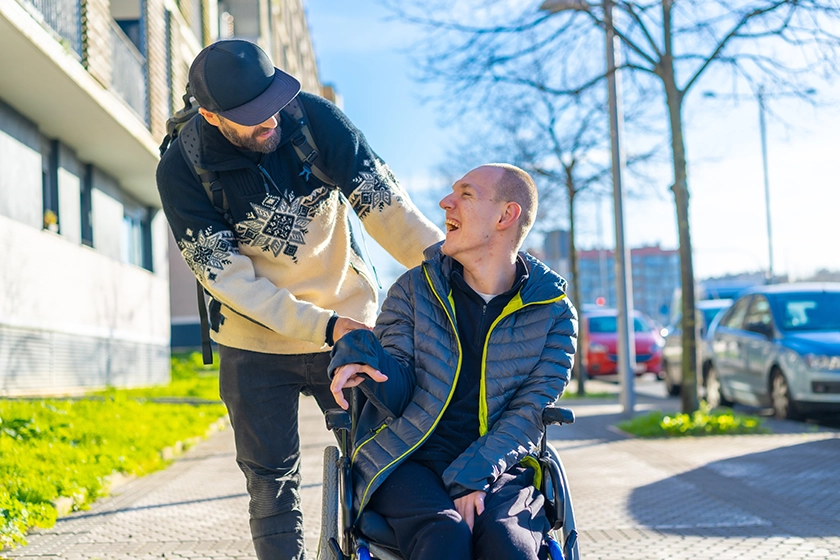Resources for Individuals
- Select a Section for More Information
- Resources for Individuals
- Resources for Licensed Providers
- Resources for State Operated Facilities
- LHRC & SHRC
- Data & Statistics
- Contact Information
Information for Individuals Receiving Services from Licensed Providers and State Operated Facilities
All individuals receiving services have the right to be treated with dignity and respect, to be told about their treatment, to have a say in their treatment, to speak to others in private, to have their complaints resolved, to say what they prefer, to ask questions and be told about their rights, and to get help with their rights.
Additionally, all individuals receiving services have the right to file a complaint against their service provider should they feel their rights have been violated. Individuals may also have someone file a complaint on their behalf. Any individual who needs to file a complaint may do so by informing their service provider of the complaint or contacting their Human Rights Advocate. The contact information for the Office of Human Rights can be found on all “It’s Your Right” posters located in each service location.
Important Information
Access the Human Rights Regulations by clicking the link below.
The Regional Map below identifies the assigned Regional Human Rights Manager for the licensed providers in each of the five regions, as well as the Senior Human Rights Manager for all of our state operated facilities. Individuals (or their substitute decision maker) who would like to make a Human Rights complaint directly to the Office of Human Rights, may do so by calling or emailing the Regional Human Rights Manager or Senior Human Rights Manager for State Operated Facilities using the contact information linked below. Contact the Manager assigned to the Region where the provider or facility involved in the alleged violation is located.
Other helpful information
For additional helpful information for complaints related to agencies outside of DBHDS, please see below contact sheet listing additional entities complaint contact information:
Referral Sheet for Non-DBHDS complaints
Making My Own Decisions
According to the Human Rights Regulations, all individuals have a right to participate meaningfully in decisions regarding all aspects of services affecting them. Individuals retaining their capacity are able to consent to treatment, services, or research, or authorize disclosure of information. However, individuals retaining their capacity may desire support in making certain decisions. Supported decision-making can help individuals retain their capacity or increase their capacity to make decisions. Virginia’s Supported Decision-Making Agreement is designed to help individuals who have capacity document the type and level of support they desire, as well as who they want to support them. Please review information on Supported Decision-Making Agreements by clicking here.
So you and others are aware of your rights – please feel free to download your own “It’s My Right!” pocket card and letter below:
If you are an Individual with a Developmental Disability (DD) or Intellectual Disability (ID) and want to learn about effective ways to be a self advocate against Abuse, Neglect, and Exploitation, we are excited to announce LEAP (Leadership for Empowerment and Abuse Prevention) Training provided by Partnership for People with Disabilities, of Virginia Commonwealth University (VCU). This training is designed for (and partially facilitated by) adults with intellectual or developmental disabilities about healthy relationships. More information can be accessed by viewing the flyer and webpage below!
Local Human Rights Committees (LHRC) and State Human Rights Committee (SHRC)
The Local Human Rights Committees (LHRC) and State Human Rights Committee (SHRC) ensures due process for the individuals within our service delivery system.
The LHRCs and SHRC consist, in part, of individuals receiving services. If you are an individual receiving services, or you know of an individual receiving services, considering volunteering for a LHRC in your area or for the SHRC.
More information on the LHRCs and the SHRC, along with the applications, can be found on the LHRC & SHRC tab of the Office of Human Rights webpage.
Attending a Fact-Finding Review? Please see the FAQ’s below to help prepare!
HR Access
HR Access is an initiative to assist individuals, authorized representatives, family members and other stakeholders with expanding their understanding of Human Rights. It is important to know that each individual receiving services is valued and their rights are guaranteed and protected while in services.
Rights Here, Rights Now!

By disAbility Law Center of VA
Rights Here, Rights Now! is a disAbility Law Center of Virginia podcast. The disAbility Law Center of Virginia is the protection and advocacy agency for people with disabilities in Virginia. This is the trailer episode where we discuss the purpose of the podcast and what is to come! Full episode transcription in episode details.






